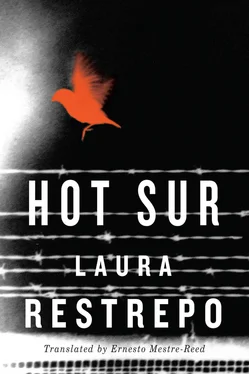For María Paz, who didn’t yet have a defense attorney, Pro Bono’s physical appearance hadn’t been a big deal. Not having a defense attorney under the critical circumstances in which she found herself was like going to war without an army or arms, not knowing who her enemy was, or what she was accused of, and worse yet, not quite knowing exactly what she had become involved in. Caught up in the hubbub of the courtroom’s waiting room, María Paz hadn’t even heard her name when they called her over the loudspeaker to appear at the bench, and she was alerted only because another detainee, who had heard it, ran over to her to tell her it was her turn. Once before the judge, she could not understand what they were asking her; in her head the words sounded hollow, as if all her English had been forgotten in one swoop, and she answered whatever came into her head. Her nerves were killing her; she mumbled, contradicted herself. And slowly dug a deeper and deeper hole, incriminating herself until there was no way out. And just at that moment, as if fallen from the sky, Pro Bono, the renowned veteran attorney, an expert in the arts and tricks of the trade, appeared and took over the messy case that seemed lost from the start: the Colombian woman accused of seducing and then murdering the American ex-cop.
“Take it easy, baby, I’ll take care of you” was the first thing Pro Bono had told María Paz that day, putting his arm around her and giving her a brief squeeze on the shoulder, just long enough so that she felt the warmth of another human being; she took that spontaneous gesture as a blessing, letting her know that she wasn’t alone. Amid the noise and confusion of the courtroom, those few words, the words everyone wants to hear in the middle of one’s troubles, miraculously reached her ears: “I’ll take care of you.” A generous and powerful offer, especially under these circumstances, coming from a stranger who was asking for nothing in return, a man of odd appearance but decidedly respectable, very elegant in his own peculiar way, someone who smelled clean and refined amid the thick stench of chaos. He was one of those skinny men with big bones and an angular face, an old-fashioned aristocrat with traces of vices long abandoned and a certain attractiveness battered by the years, and enormous, intense yellow-hazel eyes like a heron. A hunchback, yes, that too, an old gentleman bent over by the burden of his hunch, an individual painfully reduced in stature. But what María Paz noticed on that first meeting was that he came to her aid like a gentleman, conveying a sense of calm and self-confidence that inspired in her a rare sensation of relief, as if suddenly the weight that she also bore on her back was lifted.
Ian Rose had wanted to make it to Pro Bono’s on time, so as not to waste any part of his quota of minutes, and at 12:20 p.m. he was seated on a fine Chippendale chair upholstered in bottle-green velour in the middle of a waiting room of the office that took up a whole floor of a flawlessly remodeled Brooklyn Heights doorman building. The office had been furnished with heavy mahogany furniture, Persian rugs on the parquet floor, a vase of fresh roses at the entrance, and a ruling equestrian motif, evident in ashtrays, curtains, pillows, and various other objects. It was one of those places made up to appear British and that seemed to smell of wood and leather, but in reality didn’t smell of anything. More aptly, it was an old-school den of scheming lawyers through and through, with over sixty years of experience litigating criminal cases in New York and other cities around the world, very high profile, “assertive and aggressive,” known for its ethical and professional conduct, with a confirmed reputation for knowing the law backward and forward, fully understanding the penal system, and promising little but delivering much. The firm was known by three names, the first of which was Pro Bono, the principal and oldest partner. Although he had retired, his younger partners were still making use of his prestigious name and had allowed him to continue to use his old office, the most spacious one and the only one with a full view of the Brooklyn Bridge. Ming had told Rose that Pro Bono had an apartment in the same building on the lower floor, where he stayed when it got too late to drive back to his house in Greenwich, Connecticut, where he lived with his wife. It’s really something , Rose thought, that there are people like that.
While he waited, Rose began to read one of the copies of The Suicide Poet and His Girlfriend Dorita. Damn, my boy was talented, he thought, and once more big tears welled up in his eyes that he quickly dried with the sleeve of his coat.
“I’ve become an old crybaby, Cleve,” he said aloud, but he was alone in the waiting room and no one heard him.
He waited for twenty minutes, twice as long as he had been promised for the meeting, and he imagined that this lawyer must be a phony, who would’ve thought? As if Rose didn’t know that he was retired with nothing to do but cross his arms and sit on his ass in the office.
“I’m Ian Rose,” he introduced himself when he finally met the man.
“I know, Mr. Rose,” Pro Bono replied, impressing on his words a certain tone that Rose didn’t quite get. “You’ve come to see me about María Paz, the Colombian girl. Look, my friend, don’t waste your time with this. She’s fine. As fine as can be, if you get my drift; and in any case there’s not much you can do for her.”
“I just want to know if it’s true that she killed her husband,” Rose asked.
“I’m sorry,” Pro Bono said, but Rose sensed that he wasn’t. “But I can’t divulge that information.”
Apparently, the charm of that lawyer who had been so kind to María Paz would not be on display for Rose. Ming had warned him that it was very likely that the lawyer would not be willing to break attorney-client confidentiality for a stranger. That was understandable, but there was an aggressive streak about him that Rose couldn’t quite figure out.
“If that’s all, Mr. Rose, let me show you out,” Pro Bono said, gesturing toward the door.
“You promised me ten minutes, sir, and not even two have passed.”
“You’re right. We can just remain in silence for the other eight minutes. Or talk about the weather. You choose.”
It seemed that this would be it. For Rose, a failure, a waste of time, in some ways an insult. The silence was tense and the air heavy. Pro Bono stood by the window, and facing the light he checked the Cartier Panthere on his wrist for the minutes left that would put an end to this impasse. Rose commanded himself to come up with something, but his mind remained blank. He had thought he’d get some solace from the lawyer, or at least some direction for his investigation, but instead he had been treated like a nuisance. Who was this Pro Bono after all, and what role did he play in the story? He may well have been a champion for the hungry of the world, but something was rotten in Denmark. Rose could not understand at all why he was being kicked out. María Paz said such flattering things about him and showed him so much respect and gratitude that Rose began to suspect that something had happened between them, something outside of the attorney-client relationship. Something in her tone alluded to the type of intimacy that those who have shared a bed cannot hide. Is that what it was then? A tussle in the sheets? Maybe that’s what it came to. But on seeing the hunchback’s figure silhouetted by the window and then taking into account that the difference in age between this guy and his client must be enormous, Rose wondered if the secret they shared wasn’t about a sexual tryst at all, but was a secret nonetheless. He decided that Pro Bono looked honorable enough not to be sneaking quickies behind the guards’ backs. But there was something between those two, perhaps some intrigue more subtle than sex, although he knew anything was possible. It was likely that María had been won over by the attorney’s masculine vibes, with his fine wardrobe, and the keys to the Ferrari or Aston Martin that he had parked outside, but more than anything by the dignified solemnity that the protuberance on his back lent him.
Читать дальше












